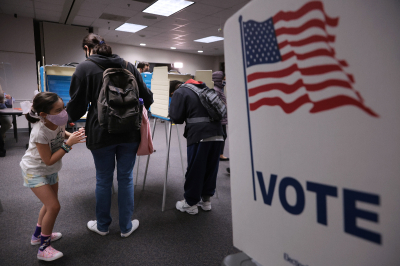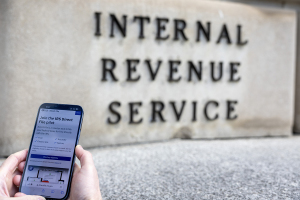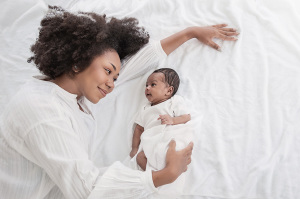The main concern for Christian voters?

Sometimes prophecies, intended to be imminent in fulfillment, actually may be more foretelling of future events. Perhaps that was the case when just before the Iowa Caucuses in 2016 then presidential candidate Senator Ted Cruz declared in a speech before a group of Evangelical supporters that we must “awaken the body of Christ that we might pull back from this abyss.”
In a day when over 25 million Christians eschew their right to vote in any given presidential election, 65 million do not participate in local elections, and 15 million are not registered voters, the good Senator’s cries seemingly have not been heeded. Now as we face the crucial presidential election cycle in 2024 the nation is in desperate turmoil and appears ready to make the leap into oblivion more so than at any time in recent history. Not only that but those people who self-identify as Christians are seeing their overall numbers dwindle in comparison to a more non-religious subset of voters. With all that, it certainly is easy to see how over these last eight years the abyss to which Senator Cruz referred has grown even bigger than any of us could have ever imagined.
Initially, by way of a disclaimer here, I should admit that for most of my life, I have been a political junkie. Over the span of more than six decades, I have been both an observer and an active participant in many of the political races that have shaped my generation and those that have followed in succession. Certainly, there have been those times when the soul of the nation has been placed on trial by the intensity of the issues that unfolded before us. Who could forget the 1964 election to replace the assassinated President John F. Kennedy or the 1968 elections, which featured two major assassinations, Bobby Kennedy and Martin Luther King? Then added to those were the widespread riots throughout our country, including the city of Chicago during the Democrat National Convention. Obviously, there have been many other difficult and extremely important contests for the heart of the nation over the years. In fact, the argument could be made that the election of a President is always one which by its very nature is crucial to the well-being of America.
But, here in 2024, we just intuitively know that something is different, don’t we? Faced with what many have labeled as a make-or-break decision as to who will lead our nation for the next four years, we understand that the stakes have never been higher. Perhaps in the minds of many voters though, the choices have never been lower. In reality, as late as it is, there is still a great deal of uncertainty as to who the candidate will be to carry the banner of the Democrat party. Their erstwhile leader and current president have painfully faltered greatly coming out of the gate. On the other hand, Republicans are faced with the dilemma of a candidate who has rightfully or wrongfully been convicted of a number of felonies and who faces many more court dates perhaps even before the votes are all counted.
Is it any wonder that as the day of the election draws nearer and nearer, various elements of our electorate are being scrutinized to determine who they will cast their ballots for in the upcoming presidential race or even if they will vote at all? Perhaps no other group is being watched more closely than those who at least self-identify as Christians. No doubt, religion has played an integral part in politics since the earliest days of our nation. As a people of The Book, we are commanded by Christ himself to “render to Caesar, the things that are Caesar’s and to God, the things that are God’s.” That admonition alone should cause Christians in America to be actively involved in the voting process not only to be good citizens of our nation but also to influence the country based on the calling of God in our lives. So, for Christians as participants in a republican form of government to not vote arguably could be contrary to the requirements placed on us by Christ Himself. Mike Sharrow, CEO of C12, who recently in collaboration with My Faith Votes to effectuate a workplace effort to encourage people of faith to vote in elections all the way from the presidency down to local interests, put it succinctly as he said, “When we don’t vote, we are actually failing to engage the authority that has been entrusted to us.”
To be sure those who claim to be faith-based voters have not always aligned behind a single candidate or party. For instance, white Evangelicals tend to vote Republican while African American Evangelicals tend to vote Democrat. At the same time, you see differences in levels of support amongst those who hold themselves out to be Catholic and those who are Jewish, with both of these groups at least tending in recent elections to support Democrat candidates. Ironically, in the past few elections, those who adhere to the religion of Islam have tended to side with the Democrat party almost to the same extent as Jews. Then there is always the divide between those “Christians” who attend church regularly (Republicans) and those who seldom attend (Democrats). The divisions amongst faith groups’ voting patterns could go on probably ad nauseam.
Nevertheless, faith-based voters may be one of the most critical blocks in this year’s election and could very well become the single most important deciding factor. With that being said, recent polling indicates a clear favorite amongst the candidates in the eyes of voters who claim a Christian basis. Nathan Gonzales of Inside Elections was recently quoted in an article where he declared, “It’s becoming increasingly clear that President Trump's appeal among religious voters is expanding. As we approach Election Day, every vote, particularly from faith voters, will be crucial.”
This actually may bode well for Mr. Trump in his quest to regain the presidency in spite of his legal troubles. Recent polling has indicated a significant trend in the coalescing of the faith-based vote in his favor, at least for the time being, even despite the softening of his stance on the most important issue of abortion. Not only is Mr. Trump polling well in the traditional Evangelical church-going group, but he is also making great inroads into religious groups that have tended to vote with the opposing side over the years. Perhaps one of the clearest examples of this can be found in the Jewish vote, which appears to be making a full-fledged exodus from the Democrat party because of the pro-Palestinian stance of many Democrat leaders and the perceived lack of support by the Biden administration for Israel in the aftermath of the Hamas terrorist attack of October 7, 2023.
There also seems to be a clear erosion of support amongst some traditionally Democrat-leaning Christian groups because of Mr. Biden’s and his party’s staunch pro-abortion stance. Jay Richards, a scholar at the Heritage Foundation, was recently quoted in the CBN article in which he highlights the deepening divide on religious issues by stating, “Despite his outward adherence to Catholicism, Joe Biden remains steadfastly pro-abortion, which continues to alienate many religiously inclined voters.” This “any time for any reason” position on the murder of the unborn is unsettling to a large portion of Hispanic Catholic and African American Christian voters as well, which is further eroding the support that traditionally belongs to the Democrat candidate.
That same CBN article goes further in stating that “this shift underscores a growing coalition of religiously motivated voters rallying behind Trump, in many cases driven by his conservative policies.” The writer also points out that “Trump has strategically emphasized religious liberty and pro-life policies, presenting himself as a champion of traditional American values.” Whether you like or dislike Mr. Trump, there is no doubt that he has positioned himself in such a way as to actively seek the votes of people of faith while it appears that Mr. Biden has deliberately distanced himself from the group by supporting late-term abortions and extreme alphabet sex issues while at the same time turning a blind eye to severe antisemitic demonstrations across the country particularly on college campuses. To put it bluntly and plainly, Mr. Biden has done nothing to assuage the concerns of the people of faith and has literally often “poked the eye” of this important electorate group by his administration’s attacks on religious liberty and by weaponizing the DOJ, IRS, DHS, and Department of Education against anyone who dares to speak out about the incongruency of his positions with the Constitution of these United States.
At Southern Evangelical Seminary, we understand, as Pastor Sam Rodriquez of New Season Church has said, “There is an undeniable schism amongst voters regarding the role of religion in our nation.” Regardless, this schism should never, under any circumstances, cause a Christ follower to not fulfill his or her civic duty by voting. Nevertheless, when deciding which candidate is to receive the support of your ballot, the first and foremost concern of every believer should be the freedom to proclaim the Gospel without restriction. Although all of the issues in this year’s election are important, they pale in comparison to religious freedom. This great freedom is embodied in the very first phrase in the very First Amendment to our Constitution in the Bill of Rights. When you vote this November, as we urge you to do, please, for the sake of our nation and for your children’s children, keep religious freedom at the forefront of your thoughts. It is the Gospel that in the end, is the only truth that matters.
After a distinguished career as both a lawyer and a judge, Judge Phil Ginn retired as the Senior Resident Superior Court Judge for the 24th Judicial District in North Carolina. Over the course of his 22-year judicial career, he was privileged to hold court in almost 50% of the county seats in North Carolina. Currently, Judge Ginn serves as the president of Southern Evangelical Seminary.




























